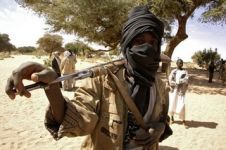Darfur rebels may unite but talks still tough
November 12, 2007 (KHARTOUM) — Negotiations to hammer out a unified stance among Darfur’s rebel groups are going well but obstacles to peace remain even if they do rejoin talks with the government, insurgent sources and analysts said on Monday.
 Unity talks in the south Sudanese capital Juba are progressing, with all but one rebel faction present, insurgents said, and they expected to develop a unified stance for any fresh talks with Khartoum.
Unity talks in the south Sudanese capital Juba are progressing, with all but one rebel faction present, insurgents said, and they expected to develop a unified stance for any fresh talks with Khartoum.
“The talks are going well,” Sudan Liberation Army (SLA) commander Jar el-Neby said. Another leader, Ahmed Abdel Shafie, said the SLA had agreed a unified position.
Negotiations opened in Sirte, Libya, on Oct. 27, but quickly fizzled out as most rebel factions refused to attend, saying they had not had enough time to agree on a unified position.
United Nations and African Union mediators are now hoping to persuade the rebels to restart peace talks in early December.
Julie Flint, joint author of a book on the 4-1/2 year-old Darfur rebellion, was somewhat optimistic on the rebel talks.
“Talks between … some SLA factions are making good progress in Juba,” she said, although the absence of SLA Chairman Abdel Wahed Mohamed el-Nur remained problematic.
But even if the rebels all show up in December, observers see few signs the talks will succeed, given lack of preparation by mediators and rebel demands for a change of venue.
Libyan leader Muammar Gaddafi upset the insurgents by comparing the Darfur conflict to a fight over a camel.
“Gaddafi’s ‘dispute over a camel’ comment and general comportment at the Sirte conference clouded the environment for these talks,” said Lawrence Rossin, a former U.S. ambassador and board member of the activist Save Darfur Coalition.
Another problem is the choice of the reluctant deputy head of Sudan’s U.N. mission, Taye-Brook Zerihoun, to be the government’s chief negotiator.
He is in charge of monitoring a peace deal between Khartoum and former rebels in the south of the country, a pact that is currently facing its biggest crisis since it was signed in 2005.
Some in the U.N. mission also question whether he has the leadership skills to head such complicated negotiations.
The joint AU-U.N. mediators also face a daunting task.
After a May 2006 peace deal signed by only one of three rebel factions, the insurgents split more than a dozen times.
And the 2.2 million Darfuris who sought refuge in miserable camps almost blindly support the SLA’s Nur — the one rebel leader who refuses to go to the talks until U.N. peacekeepers deploy in Darfur and are able to control the chaos.
“The Sirte process is based on a lot of very optimistic assumptions and at the moment none of them are transpiring,” said Sudan expert Alex De Waal.
He said the rebels may be more united in December, but not united enough. They will not want to compromise and neither will the government.
Mediators also must do more to prepare for any resumption of talks.
De Waal said at least six months of work was needed with local commanders before any credible ceasefire — the first item on the talks agenda — could be agreed.
(Reuters)
